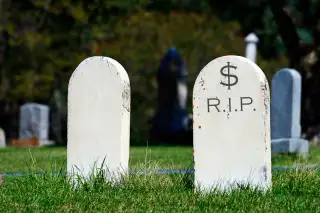This Popular Financial Advice Could Ruin Your Retirement

You may have heard of the phrase “Die Broke,” made popular by the bestselling personal finance book of the same name published in 1997. The authors, Stephen M. Pollan and Mark Levine, argue that you should basically spend every penny of your wealth because “creating and maintaining an estate does nothing but damage the person doing the hoarding.” Saving is a fool’s game, they claim, while “dying broke offers you a way out of your current misery and into a place of joy and happiness.”
I love a good contrarian argument, but for whom did this plan ever make sense? Perhaps people like Bill Gates who have so much money that they decide to find charitable uses for their vast fortune. But for the rest of us, our end-of-life financial situation isn’t as nearly pretty, and we’re more likely to be in danger of falling short than dying with way too much.
In a recent survey, the Employee Benefit Research Institute found that 20.6% of people who died at ages 85 or older had no non-housing assets and 12.2% had no assets left at all when they passed away. If you are single, your chances of running out of money are even higher—24.6% of those who died at 85 or older had no non-housing assets left and 16.7% had nothing left at all.
Now, perhaps some of those people managed to time their demise perfectly to coincide when their bank balance reached zero, but it’s more likely that many of them ran out of money before they died, perhaps many years before.
And yet the “Die Broke” philosophy seems to have made significant headway in our culture. According to a 2015 HSBC survey of 16,000 people in 15 countries, 30% of American male retirees plan to “spend it all” rather than pass wealth down to future generations. (Interestingly, only 17% of women said that they planned to die broke.)
In terms of balancing spending versus saving, only 61% of men said that it is better to spend some money and save some to pass along, compared to 74% of women. Perhaps that’s why, as a nation, only 59% of working age Americans expect to leave an inheritance, compared to a global average of 74%.
There are so many things wrong with this picture. The first is that Pollan and Levine’s formula of spending for the rest of your life was predicated on working for the rest of your life. “In this new age, retirement is not only not worth striving for, it’s impossible for most and something you should do you best to avoid,” they wrote. Saving for retirement is certainly hard, and I don’t believe that all gratification should be delayed, but working just to spend keeps you on the treadmill in perpetuity.
Besides, even if some of us say we're going to keep working all our lives, that decision is usually dictated by our employer, our health and the economy. Most of us won't have the choice to work forever, and the data simply don't support a huge wave of people delaying retirement into their 70s and 80s. And as I have written before, I don’t buy into the current conventional wisdom that planning for a real retirement is irrational.
But perhaps the most pernicious aspect of the “Die Broke” philosophy is that it takes away the incentive to our working life—to get up in the morning and do your best every day, knowing that it’s getting you closer to financial security—and the satisfaction that goes with it. In the end, I believe what will bring us the most happiness is not to die rich, or die broke, but to die secure.
Konigsberg is the author of The Truth About Grief, a contributor to the anthology Money Changes Everything, and a director at Arden Asset Management. The views expressed are solely her own.
Read next: This Retirement Saving Mistake Could Cost You $43,000